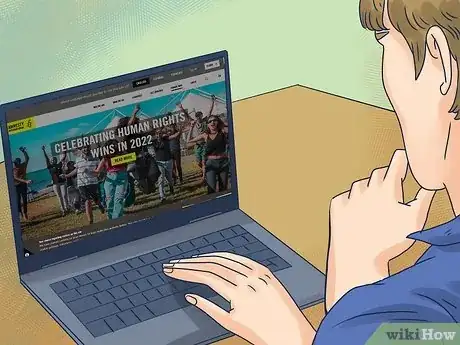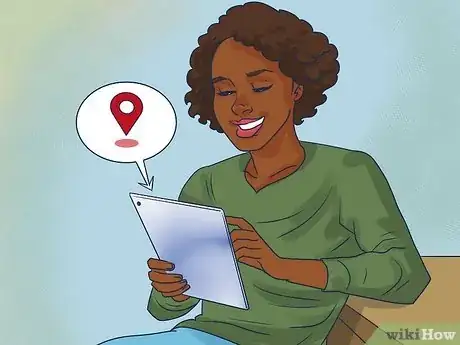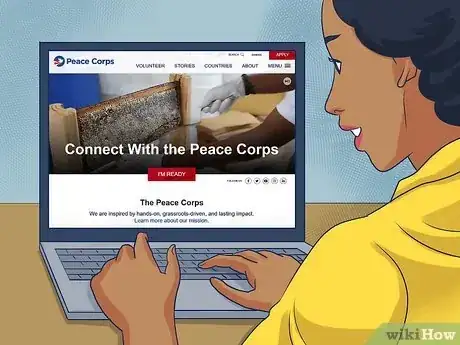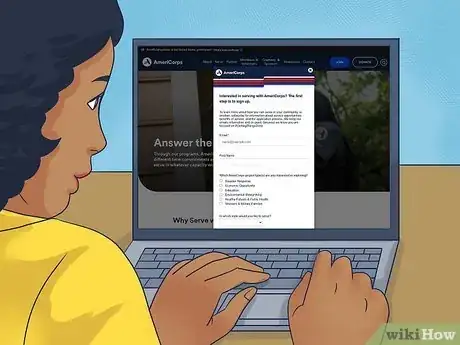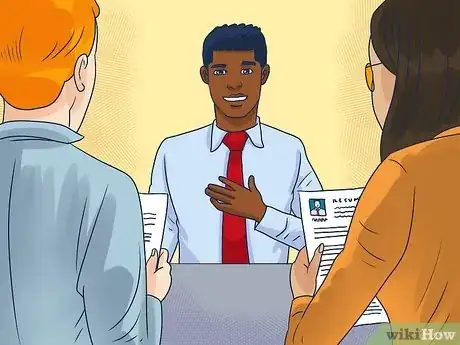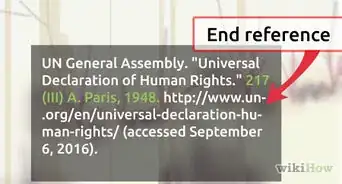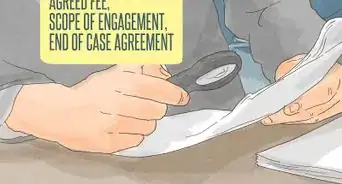This article was co-authored by wikiHow Staff. Our trained team of editors and researchers validate articles for accuracy and comprehensiveness. wikiHow's Content Management Team carefully monitors the work from our editorial staff to ensure that each article is backed by trusted research and meets our high quality standards.
There are 7 references cited in this article, which can be found at the bottom of the page.
wikiHow marks an article as reader-approved once it receives enough positive feedback. In this case, 100% of readers who voted found the article helpful, earning it our reader-approved status.
This article has been viewed 37,418 times.
Learn more...
If you care about human rights issues and improving people’s lives throughout the world, you may be interested in becoming a human rights activist. Through human rights activism, you will be able to help other people and make a real difference in their lives. Your hard work and dedication can be the difference between someone’s suffering and happiness. You can help the people who are not as fortunate as you just by dedicating your time to the right causes!
Steps
Choosing a Cause
-
1Research human rights causes. Learn which causes are important to you by conducting research online or talking to family or friends you know who volunteer or care about human rights issues. By researching and learning about various areas of human rights activism, you may find a cause that you are passionate about that you did not previously know about.
- Use the internet to conduct an online search of human rights activism. You can use a search engine to search for “human rights activism,” “human rights issues,” or “human rights volunteering.” The results that come up should give you an idea of what human rights causes, groups, and issues are out there.
- You can use an online search engine to search for famous human rights activists to become inspired by the work of other great activists, such as Martin Luther King Jr. or Nelson Mandela.
- Talk to family or friends who are human rights activists and ask them how they volunteer and what areas they focus on and why. You can learn a lot by listening to others speak about issues that are very meaningful to them.
-
2Visit Amnesty International’s website. Amnesty International is the world’s largest organization for human rights. Their website contains plenty of information about human rights issues. By visiting their website, you can learn about the violations of human rights in the United States and around the world.[1]
- Go to www.amnestyusa.org.
- Click on “Get Involved” in the top menu.
- Click on “Issues” in the menu on the left side of the page.
- Browse the human rights issues that are listed on the page. There are several areas of human rights issues that are featured on this page, including poverty, refugee and migrant rights, women’s rights, and children’s rights.
- Click on one of the issues to learn more about it. Reading about the different areas of human rights will give you a better understanding of what you would like to focus on.
Advertisement -
3Make a list. Using a sheet of paper and a pen or pencil or using a Microsoft Word document, write down or type the causes that mean a lot to you. There may be several causes or there may be just a few.
- Narrow the list of causes to one or two that mean the most to you. By narrowing your focus, you will be able to fully lend yourself to a cause, which will be the most beneficial to you and the people you would like to help.
- For example, if you care about LGBT rights, censorship, refugee and migrant rights, women’s rights, and the death penalty, you might choose one or two that are the most directly relevant to you, such as censorship and women’s rights. You can also narrow this down by picking the one that you feel the most passionate about.
-
4Decide on a cause. By choosing a cause to dedicate yourself to, you will be more likely to make a difference in your chosen area. This is because you will have more time and resources to dedicate to this particular cause, rather than spreading your time and resources too thin by being involved in several causes.
- You can visit VolunteerMatch.org to get matched to a cause based on your interests. This is a great resource because you can receive suggestions and information for nonprofit organizations in your area that need your help.[2]
Joining a Group
-
1Research human rights groups. Having decided on a human rights issue that is meaningful and important to you, you can now find a group in your area that works on the issue you are interested in.
- Use a search engine to look up human rights groups in your area. For example, you can search for “women’s rights activism in Detroit, MI” to see what results come up. This will help you locate groups in your area.
- Many national and international groups have local chapters, such as Amnesty International and the Red Cross.
- If there are no groups in your region or area that work on the issue you care about, you can contact regional, national, or international groups about working remotely. You can make phone calls, write letters, or send emails on behalf of the organization without even having to leave your home. Human Rights Watch will instruct you on how to help with certain causes, which usually involve tweeting about the issue or writing or emailing your local and regional politicians.[3]
-
2Contact the organization. Once you have found a human rights group that you would like to join, search their website for a menu option that says “Join Now” or “About Us” or something similar. This should give you information about who you can contact and how to join the group or organization.
- Reach out to the group’s leaders via email, social media, or a phone call. It is highly likely that they will be happy to hear from you and be grateful to receive your help. Ask them how you can get involved and where they need the most help. You can say something like, “I’m interested in getting involved in your organization. What is the best way for someone new to get involved?”
- You may have to fill out an application to get involved with certain organizations. The “How to Join” page should direct you to this information and the application. This is more likely to be the case for paid positions.
- If you can’t find contact information for anyone, you can submit your information or questions via an online form. This type of form, if applicable, can be found under “Contact Us.” They may also list a general phone number or email that you can use.
-
3Go to an upcoming meeting. Many local chapters of national organizations and smaller human rights activist groups will post a schedule on their website or post about an upcoming media on their social media accounts. These meetings are usually about direct activism and what its members can do in the near future, such as planning protests or rallies.
- Monitor the website and social media accounts to see when the next meeting is and make a note on your calendar to attend the next one.
- If the meeting is not posted anywhere that you are able to find online, email, call, or message a group/organization leader to find out when and if they meet.
-
4Get involved. After you have contacted group or organization leaders and have attended a meeting or two, if applicable, you should be familiar with the organization and the work that they do and be able to take on an active role.
- Regularly attend meetings and group activities. This will help you stay abreast of the latest news regarding the issues and what others are doing to help. This will also help you identify activities
- Volunteer for activities that you are comfortable with. Depending on your experience and qualifications, you can help with things like stuffing envelopes for mailings, making phone calls, knocking on doors, travelling and building projects, working with law enforcement, providing resources, doing research, conducting on-site investigations of abuse, drafting reports/articles about human rights issues, or counseling individuals.
Becoming Active
-
1Donate your time. A great way to become a human rights activist is to use your time to actively campaign for the issues that are important to you. Many organizations and groups rely on the physical presence and assistance of other people and would not be able to be in operation otherwise.
- Talk to the individuals who are in charge and find out how you can help, based on your experience and what you are comfortable with. Depending on the organization, this could be anything from sweeping floors to building a house. Be prepared to work hard no matter what you do.
-
2Donate money. If you are short on time and/or have enough money, you can donate money to the groups/organizations/causes that mean the most to you. Many organizations rely entirely on donations from individuals like you who care about their causes.
- Look on the website or talk to the individuals who work for the organization to find out how to donate money. This can be done via cash, check, or online transactions such as PayPal. Most organizations list how you can donate on their website or social media pages.
- Obtain a receipt from your charitable donation to save for tax purposes. You can often write off charitable donations on your taxes.
- If you don’t have the extra funds to donate, don’t worry. Donating your time is an effective way to help the causes you are concerned about.
-
3Join the Peace Corps. The Peace Corps is a volunteer organization for adults run by the United States government that focuses on making a difference in the community abroad.[4] Members of the Peace Corps will travel to other countries for a certain amount of time, usually about two years, to work on assignments and are paid positions. It is a significant commitment if you choose this route.
- Assignments are generally categorized into sectors, such as education, agriculture, health, community economic development, environment, or youth development. Depending on your qualifications and interest, you could be teaching in a school, working with farmers to teach them about soil erosion, working in a classroom setting with entrepreneurs and business owners to develop and market their products, teaching environmental awareness to organizations and schools, and working in communities to promote health and programs to provide support for those in need.
- In your internet browser, go to www.peacecorps.gov.
- In the top right corner, click on “Apply Now”.
- Click on “Start Your Application”.
- Fill out and submit the application.
- Make sure that you apply by the stated deadline. It is advised that you apply nine to twelve months before you want to leave.[5]
-
4Join AmeriCorps. If you do not want to leave the country and want to help people in the United States, AmeriCorps is the ideal organization for you. AmeriCorps is a federally-run program for adults who want to volunteer within the borders of the United States. A term is usually ten months to one year and is a paid position.[6]
- In your browser, type in www.nationalservice.gov/programs/americorps.
- In the left hand menu, click on “Join AmeriCorps”.
- Under “Join AmeriCorps”, click on “I’m Ready to Serve”.
- Select your area of interest and the state you would like to work in.
- A list of programs will come up. Browse these opportunities for one (or more) that interest you.
- Click on the programs that appeal to you.
- Click on “Apply Now!” and submit your application.
-
5Go on a mission trip. If you are interested in travelling around the country or abroad to help other people for a relatively short amount of time, such as a few days or months, then a mission trip would be a good option for you.
- Inquire within the organizations you are already involved in to see if there are any mission trips that are planned.
- Inquire at a national or international organization to see how you can travel and help others, such as Habitat for Humanity or the Red Cross. Visit their website to see how you can join and what is required.
- If you do not know of any mission trips coming up in your area, search online or ask friends and family. You can use your search engine to search for “mission trips in Detroit, MI.”
Turning Human Rights Activism into a Career
-
1Choose a career path. You may want to have an idea of what you would like to do for a career that is directly involved in human rights activism so that you can plan out your career path. Many paid human rights activists take on important advocacy work to change the conditions of the individuals around the world who are suffering by working to influence and change the policies of governments and international institutions.[7]
- It is useful to pick a career that is in line with the volunteer work you are currently doing, so that you can continue to gain experience to obtain a paid position in the future. For example, if you would like to have a career in working for LGBT rights and are already volunteering in that area, you should continue what you are doing so that you can leverage your experience into a paid position.
-
2Pick a major. If you have chosen the college route and are entering your first year of college, or looking to change your major, you can pick a major that will suit a job in a field related to your human rights activism.
- Some majors include social work, sociology, women’s studies, philosophy, and law.[8]
- For example, if you would like to be a lawyer someday, you can major in law or pre-law, depending on the institution you are attending and your level of study, and study international law or human rights law.
-
3Apply for positions. You will want to apply for as many positions as possible if you would like to obtain a paid position in human rights activism. This will increase your chances of getting an interview.
- Look for job opportunities online and by asking fellow activists if they know of any opportunities. You can start by asking, "Do you know of any jobs that will be opening up in the near future?" of the people you know at any organizations you currently volunteer with.
- There are a few websites that index human rights activist jobs, such as HumanRightsCareers.com and Human Rights Job Board.
- Many human rights activist positions will require previous experience with volunteering and references from past volunteer work. Be sure to stay in touch with individuals you have worked for in the past so that you can use them as a reference to obtain a paid position.
Community Q&A
-
QuestionI am in a country where human rights are of no value and are really violated. I want to be a voice for the voiceless ones, what can I do?
 Community AnswerBe strong. Be the change. Group with other people and, whilst showing love and compassion, show how important the voiceless ones are, as well as your voice.
Community AnswerBe strong. Be the change. Group with other people and, whilst showing love and compassion, show how important the voiceless ones are, as well as your voice.
Warnings
- Don't expect to completely save the world overnight—there are always new problems. Just try to make the world a better and happier place however you can, one good deed at a time.⧼thumbs_response⧽
- Be wary of charities that are a scam and do not actually use the money you donate for the cause you think are donating to.⧼thumbs_response⧽
- If you are a minor, ask your parents’ or guardians’ permission before volunteering your time or money.⧼thumbs_response⧽
References
- ↑ http://www.amnestyusa.org/about-us
- ↑ http://www.volunteermatch.org/
- ↑ https://www.hrw.org/join-us/take-action
- ↑ https://www.peacecorps.gov/about/
- ↑ https://www.peacecorps.gov/apply/
- ↑ https://www.nationalservice.gov/programs/americorps/join-americorps/americorps-faqs
- ↑ http://www.academicinvest.com/arts-careers/philosophy-careers/how-to-become-a-human-rights-activist
- ↑ http://www.academicinvest.com/arts-careers/philosophy-careers/how-to-become-a-human-rights-activist

